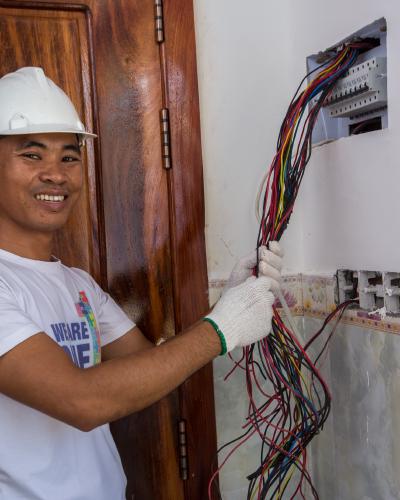A program supported by France will transform Cambodia’s labor force through reforms in technical and vocational education and training, enhancing skills necessary for critical service and industry sectors. Ultimately, the program aims to improve employability, increase private sector involvement, and support sustainable economic growth by equipping workers—especially women—with industry-relevant skills.
building a skilled workforce
Sectors reliant on skilled labor—including garment manufacturing, construction, light industry, and tourism—have long been key pillars of Cambodia’s economy. Before the COVID-19 pandemic, service and industry sectors together accounted for more than 75% of the gross domestic product.
Cambodia’s economy showed remarkable resilience post-pandemic, rebounding with growth rates of 5.2% in 2022 and an estimated 6% in 2024. This recovery was fueled by a strong rebound in garment exports, renewed vitality in tourism-related services, and rising agricultural exports. However, while Cambodia’s overall macroeconomic conditions and policies are satisfactory, risks remain. Slowing global economic growth and accelerating inflation continue to pose challenges, particularly for poor and vulnerable people. The education sector, too, still feels the pandemic’s impact given the 1.5 years of schooling lost, a setback that could widen income disparities and limit the future productivity of the current generation of Cambodian students.
Despite notable improvements in human development, Cambodia faces persistent challenges. Many workers lack basic literacy, numeracy, and digital skills. Investors struggle with the shortage of local skilled workers in engineering and mechanical fields, such as automation technicians, product line supervisors, network engineers, system architects, mechanics, and software programmers. As a result, many of these roles are filled by expatriates. In 2020, only 10.7% of Cambodia’s labor force held medium- and higher-level technical positions (professionals, technicians, associate professionals, and plant/machine operators), well below neighboring countries such as Viet Nam (19.1%) and Malaysia (29.4%).
a comprehensive approach to skills development
Three key challenges contribute to the broader constraints facing Cambodia’s technical and vocational education and training system: the absence of a future-ready comprehensive skills development program that focuses on the digitalization of the manufacturing sector, limited private sector roles in skills development, and insufficient funding and partnerships to scale solutions. These challenges limit the employability and productivity of both the current and future labor force which may prevent Cambodia from diversifying into a knowledge-based economy.
Recognizing these gaps, ADB, with cofinancing from Agence Française de Développement, approved the Skills for Future Economy Sector Development Program (Subprogram 1).
The project is working on specific outcomes that include:
- improved employability for the current and future labor force;
- increased number of diploma graduates finding decent work in priority skill areas (industrial engineering, machining technology, and information technology networking and programming); and
- enhanced private sector participation through policies incentivizing skills development and industry transformation road maps.
At the heart of this program is a strategy that blends policy reform with targeted investments. Guided by Cambodia’s Skills Development Road Map 2023–2035—which focuses on gender-responsive, inclusive, and coordinated skills development—the program is introducing comprehensive changes to the national technical and vocational education and training (TVET) system.
The program will establish competency standards, improve links between industries and TVET, and transform three technical training institutes into public administrative institutions. With greater autonomy and upgraded facilities, these institutes will be better equipped to deliver training aligned with the demands for digitization and the green economy. A new law is also being developed to govern TVET, ensuring consistency and quality across the system. Modular training packages in critical skills like industrial engineering, machining technology, and information technology will be developed to meet the needs of the industries and the green economy, alongside intensive capacity building for trainers.
empowering industries and workers
Partnerships with industry leaders are central to the program’s success. The government has partnered with the Textile, Apparel, Footwear & Travel Goods Association to upskill workers, especially women, and transform the industry from low-skilled labor to a technology-driven workforce. This includes developing a skills framework for the industry and offering demand-based training for mid-level managers and technologies.
At the same time, the Skills Development Fund (SDF) is being strengthened and institutionalized by making it a permanent fund. The SDF is a government and private sector-led financing mechanism that supports industry-relevant training programs to enhance the skills of the workforce and strengthen private sector engagement in skills development. The financial management, governance, marketing, and gender-responsive communication skills of the sector development program staff will be strengthened. Additionally, the capacity of other priority industry associations, such as automotive and electronics, will be enhanced to improve productivity and diversify exports. The project aims to train over 7,000, with at least 35% being women, contributing to sustainable economic growth.
toward a more inclusive and competitive economy
As Cambodia aspires to become a knowledge-based, industrial economy, its investment in human capital is more crucial than ever. The Skills for Future Economy program is a forward-looking initiative that will not only prepare Cambodians for the jobs of tomorrow but will also help attract greater private sector investment and foster inclusive economic growth.
By equipping workers with the right skills and empowering industries to lead the way in training and development, Cambodia is charting a sustainable path toward greater prosperity and resilience. This is more than a workforce development program—it is a commitment to unlocking the full potential of Cambodia’s people and economy.
“With support from France and ADB, the government is undertaking bold reforms to equip its workforce with the skills needed for a rapidly evolving economy. By modernizing training facilities, strengthening industry linkages, and promoting inclusive, higher-skilled employment, Cambodia is laying the foundation for more resilient and broad-based economic growth.”


